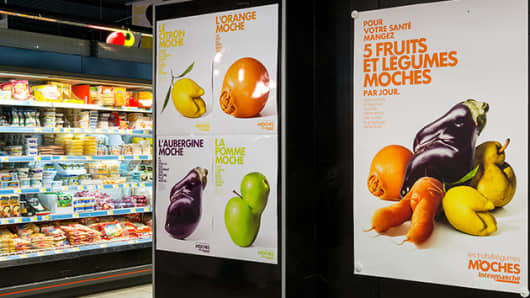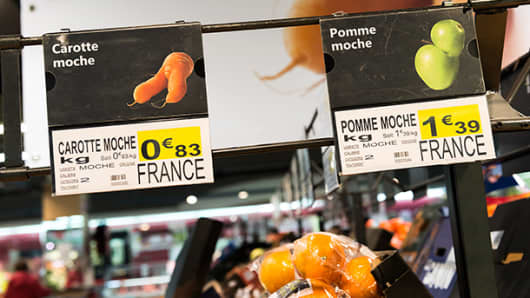 It could soon be time to embrace your ugly side as disfigured eggplants, ridiculous potatoes, grotesque apples and ugly carrots could soon hit a supermarket – all in hope that it will cut down on food waste.
It could soon be time to embrace your ugly side as disfigured eggplants, ridiculous potatoes, grotesque apples and ugly carrots could soon hit a supermarket – all in hope that it will cut down on food waste.
Sold at a 20 to 30 percent discount to their perfect counterparts, the operation was a hit.
 It could soon be time to embrace your ugly side as disfigured eggplants, ridiculous potatoes, grotesque apples and ugly carrots could soon hit a supermarket – all in hope that it will cut down on food waste.
It could soon be time to embrace your ugly side as disfigured eggplants, ridiculous potatoes, grotesque apples and ugly carrots could soon hit a supermarket – all in hope that it will cut down on food waste.
Sold at a 20 to 30 percent discount to their perfect counterparts, the operation was a hit.
"We were the first ones to be surprised by the success", Vanessa Robineau, spokesperson for Intermarché, France's third largest supermarket by market share, told CNBC by phone, adding that the response was "phenomenal".
The supermarket told CNBC that the "ugly" products available on each of their one-off operation were all sold, but were unable to provide any specific sale figures.
Since then, the supermarket chain has repeated the one-off operation in a dozen of its Parisian stores and other French retailers were quick to follow in the chain's footsteps.
According to the Food & Agriculture Organization (FAO) of the United Nations, 30 percent of global food production is lost after harvest, or wasted in shops, households or catering services, representing $750 billion worth of food every year – and a lot of this food is just thrown away before it hits the shelves because it doesn't conform with the idea of what a piece of fruit or vegetable should look like.
Furthermore, the organization highlights that in industrialized countries, 40 percent of food losses occur at the retail and consumer level and, estimated at around 222 million tons, this represents just about the total net food production in Sub-Saharan Africa.
"I'm very happy with this initiative", Robert van Otterdijk, agro-industry officer at the FAO told CNBC.
"The idea and willingness of retailers to go this way are extremely positive."
According to the FAO, 30 percent of global food production is lost after harvest, or wasted in shops, households or catering services, representing $750 billion worth of food every year.
Furthermore, the organization highlights that in industrialized countries, 40 percent of food losses occur at the retail and consumer level and, estimated at around 222 million tonnes, this represents just about the total net food production in Sub-Saharan Africa.
A missed opportunity
The French initiative is not isolated. Other supermarkets have started to relax some of their standards. Sainsbury's, the U.K.'s third-largest food retailer by market share, is one of them. Although the vegetables they sell is not defined as "wonky", the retailer started selling smaller or irregular shaped fresh produce in its "Basic" after a drought impacted British crops in 2012.
But for Martin Bowman, U.K. gleaning coordinator at the Feeding the 5k campaign – which focuses on tackling food waste at the global scale - British supermarkets do not do enough to promote misshapen produce.
 "We think retailers play a role in perpetrating those [cosmetic] standards", he said, and usually blame the consumer's lack of willingness to buy these less-than-perfect fruit and veg.
"We think retailers play a role in perpetrating those [cosmetic] standards", he said, and usually blame the consumer's lack of willingness to buy these less-than-perfect fruit and veg.
A survey conducted by the U.K.'s Institution of Mechanical Engineers released in February 2013 found that 80 percent of U.K. shoppers would be willing to buy fruit and vegetables which are not perfect in shape or colour.
Dr Tim Fox, head of energy and environment at the Institution of Mechanical Engineers wrote in the survey that "despite perceptions held by commercial buyers, U.K. consumers are willing to purchase imperfect-looking fruit and vegetables. This food, which is perfectly good to eat, is often rejected by buyers before it leaves the farm as it does not meet cosmetic requirements".
Supermarkets should take on the challenge of marketing this wonky food, believes Bowman and "take those risks away from the farmers".
Big bad retailers?
However, whether the initiative to embrace the ugly could impact food prices or improve global food security or not is less clear.
"We've witnesses first-hand how sometimes, whole fields can go to waste", Martin Bowman said, as "about 20 to 30 percent of waste in the fields is due to cosmetic standards".
For the FAO's van Otterdijk, the Intermarché scheme could lead to reduced production but "it's difficult to say" whether it could reduce food security worldwide.
The FAO, he continued, is "trying to investigate to what extent wasting food in one part of the world has an effect on access to food and price of food in other parts of the world".
In the meantime, French consumers await October 16, when to celebrate the national day against food waste, Intermarché will repeat its operation on a national scale.
This news was originally published by the CNBC website written by Alice Tidey.
Picture and video credited to CNBC.

